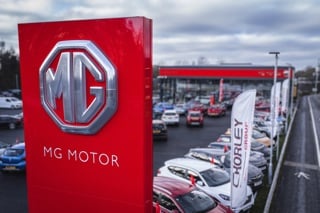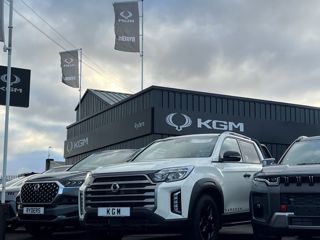Volvo could have a solus-site network by 2020.
The end-of-the-decade aspiration comes with confidence the dealer body would be viable and sustainable based on attractive and realistic margins from a revitalised model line-up.
Having joined in October, Jon Wakefield, Volvo Car UK sales director, has set himself this and a number of other targets, measures by which he believes his impact will be judged at a company he believes has a legacy of customer confidence in this country and has been revitalised by recent commitments of Asian investment.
A mid-term objective for the UK, ahead of 2020, is an annual registration total of 40,000 units, market share at 2% and dealer profitability to be in the region of 2% return on investment.
Wakefield admits that on current performance the challenge is not inconsiderable: dealer profitability is at around 1%, market share has gone from 1.84% in 2010 to 1.55% in 2012; sales from 37,435 in 2010 to 31,790 in 2012.
Wakefield said: “In the short term we’re not looking for massive increases in market share and nor in the long-term are we looking for huge market share opportunity.
"We very clearly state that we want to sell 800,000 cars globally by 2020 and to do so profitably.
“We’ve not broken that down into individual markets, but our stated objective for the mid-term is 40,000 units in the UK and we’re looking at in broad numbers.
"I want to do 34,000 - 35,000 this year and grow that to 40,000 with a similar number of dealers who I want to be profitable to the industry benchmark of 2% RoS or more.
“Our vehicle margins year-on-year 2011 and 2012 are fairly static so in a very difficult marketplace where margins have taken a hit generally we’ve done well.”
For Wakefield, the global sales target for 2020 for Volvo is less important than the interim goal to grow the UK market for the brand in incremental steps.
But he does cite the possibility that in seven years’ time the network could be characterised by one factor.
“All our network could be based on solus Volvo sites by 2020, with bricks and air between our dealerships and those of other brands,” he said.
“The emerging product line up over the next two years, the long-term investment in Volvo and the standing the brand has in the UK make it entirely appropriate that we could have a viable and profitable dealer network on this basis.”
Today around 60% of Volvo retailers are on solus sites.
His immediate aim is to tackle the shortfalls in performance, with the contributory issues largely around product at the end of their lifecycle.
“We’ve been in a holding period in some senses.
Last year saw the end of S40, C30 and the V50, both of which sold at reasonable volumes, and we started with V40.
So in between these factors we’ve had this fairly typical drop back in volumes while models changed.
And we’ve not necessarily replaced like with like as the V40 is a different proposition to V50 and S40.”
Confidence, Wakefield said, is starting to build: V40 orders exceed forecasts and a PCP offer on V40 sees it compete with the likes of Volkswagen Golf.
“We’ve got a car the motoring press are saying is better than Mercedes-Benz A-Class that a dealer can deliver for the same sort of value that VW can deliver with the Golf – quite a compelling offer.”
He forecasts that dealers will have made a 1% return on sales in 2012, which while it isn’t where he wants it to be, “is an awful lot better than they’re making out of other franchises”.
An additional black mark against the brand that Volvo believes it is addressing is the slide in dealers’ value perception of the brand.
Dealers’ views of the brand have worsened with an overall brand value assessment in the National Franchised Dealer Association’s Dealer Attitude Survey going from 7.5 out of 10 a year ago to 6.9 in the recent survey.
There are now 110 new car retailers in the UK network, but Volvo UK managing director Nick Connor said in July he plans for 90 in the next few years through “gradual consolidation” motivated by the need for a better profit model and a throughput of around 450 new car sales per dealer, instead of the current 273.
There is an obvious correlation between survey scores and return on sales, but looking into the detail, as Wakefield did prior to joining Volvo, he sees another contributing negative: the change in a global distributor after ‘“horrific” delivery issues.
“Our new distributor is completely bound in now to our way of thinking, plus we’ve dealt with issues around the failure to communicate where a customer’s vehicle was in the delivery process and so we’re back on track now,” he said.




















Login to comment
Comments
No comments have been made yet.